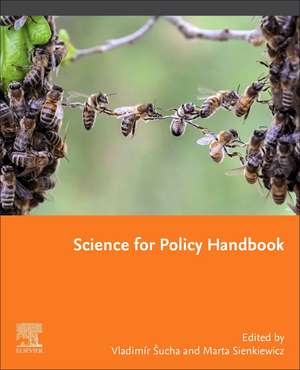Science for Policy Handbook
Editat de Vladimir Sucha, Marta Sienkiewiczen Limba Engleză Paperback – 15 iul 2020
- Covers the vital area of science for policymaking
- Includes contributions from leading practitioners from the Joint Research Centre/European Commission
- Provides key skills based on the science-policy interface needed for effective evidence-informed policymaking
- Presents processes of knowledge production relevant for a more holistic science-policy relationship, along with the types of knowledge that are useful in policymaking
Preț: 372.09 lei
Preț vechi: 594.10 lei
-37% Nou
Puncte Express: 558
Preț estimativ în valută:
71.21€ • 74.07$ • 58.79£
71.21€ • 74.07$ • 58.79£
Carte tipărită la comandă
Livrare economică 05-19 aprilie
Preluare comenzi: 021 569.72.76
Specificații
ISBN-13: 9780128225967
ISBN-10: 0128225963
Pagini: 288
Dimensiuni: 191 x 235 mm
Greutate: 0.5 kg
Editura: ELSEVIER SCIENCE
ISBN-10: 0128225963
Pagini: 288
Dimensiuni: 191 x 235 mm
Greutate: 0.5 kg
Editura: ELSEVIER SCIENCE
Public țintă
Scientists and knowledge managers in universities, research institutes, governments, NGOs and private sector companiesCuprins
SECTION I: Science for Policy 1.0: Deficit Model
1. Against the Science-Policy Binary Separation: Science for Policy 1.0
2. Post-Normal Science: How Does It Resonate With the World of Today?
SECTION II: Science for Policy 2.0: Co-creation
3. Institutional Framework for the Science–Policy Interaction
4. Skills for Co-creation
5. Achieving Policy Impact
6. From a Policy Problem to a Research Question: Getting It Right Together
7. Working Through Communities
8. Engaging With Citizens
9. The Big Data and Artificial Intelligence: Opportunities and Challenges to Modernise the Policy Cycle
10. Navigating Interests in a Science for Policy Environment
SECTION III: Backbone tools of Science for Policy 2.0
11. Complexity Science in the Context of Policymaking
12. Foresight - Using Science and Evidence to Anticipate and Shape the Future
13. Design for Policy
14. Monitoring the Impact of Science and Evidence on Policy
SECTION IV: Science for Policy 2.0 in Specific Areas
16. Knowledge-Based Crisis and Emergency Management
17. Behavioural Insights for EU Policymaking
18. The Use of Quantitative Methods in the Policy Cycle
19. Place-Based Solutions to Territorial Challenges: How Policy and Research Can Support Successful Ecosystems
1. Against the Science-Policy Binary Separation: Science for Policy 1.0
2. Post-Normal Science: How Does It Resonate With the World of Today?
SECTION II: Science for Policy 2.0: Co-creation
3. Institutional Framework for the Science–Policy Interaction
4. Skills for Co-creation
5. Achieving Policy Impact
6. From a Policy Problem to a Research Question: Getting It Right Together
7. Working Through Communities
8. Engaging With Citizens
9. The Big Data and Artificial Intelligence: Opportunities and Challenges to Modernise the Policy Cycle
10. Navigating Interests in a Science for Policy Environment
SECTION III: Backbone tools of Science for Policy 2.0
11. Complexity Science in the Context of Policymaking
12. Foresight - Using Science and Evidence to Anticipate and Shape the Future
13. Design for Policy
14. Monitoring the Impact of Science and Evidence on Policy
SECTION IV: Science for Policy 2.0 in Specific Areas
16. Knowledge-Based Crisis and Emergency Management
17. Behavioural Insights for EU Policymaking
18. The Use of Quantitative Methods in the Policy Cycle
19. Place-Based Solutions to Territorial Challenges: How Policy and Research Can Support Successful Ecosystems
Recenzii
"Overall, this is a specialised work which complements the work of authors such as Prof Patrick Dunleavy3 whose focus has been directly on how academics can increase their impact, built on decades of research." --Journal of the Australian Library and Information Association
"Nineteen papers explore the transformation of science for policy practices, highlighting the work of the European Commission’s Joint Research Centre (JRC) and its suggested best practices and ideas for delivering progress for our societies, economies, and planet." --Journal of Economic Literature
"No comparable policy books exist. This book is unique in its approach to science and integration into the policy development process. It is timely when global discussions are occurring regarding the use of science to control, treat, and prevent COVID-19." --Doody
"Nineteen papers explore the transformation of science for policy practices, highlighting the work of the European Commission’s Joint Research Centre (JRC) and its suggested best practices and ideas for delivering progress for our societies, economies, and planet." --Journal of Economic Literature
"No comparable policy books exist. This book is unique in its approach to science and integration into the policy development process. It is timely when global discussions are occurring regarding the use of science to control, treat, and prevent COVID-19." --Doody
